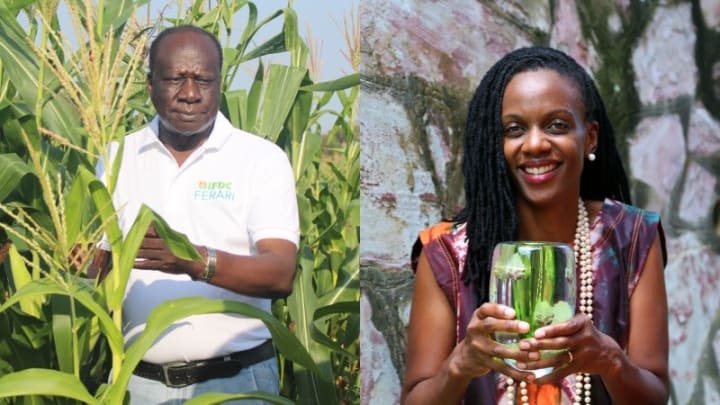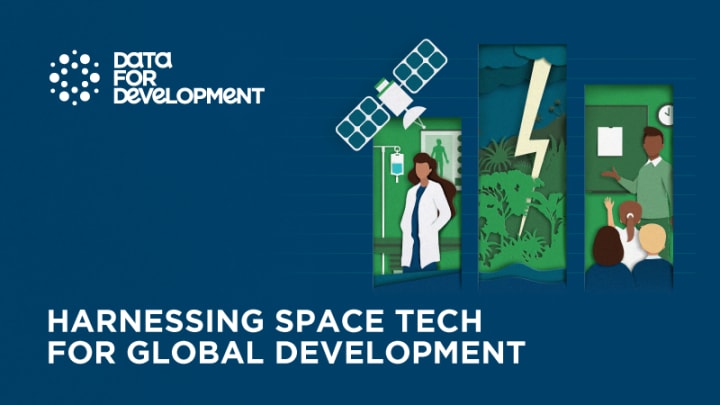
NAIROBI — A soil scientist and a remote sensing specialist were jointly awarded the Africa Food Prize at the African Green Revolution Forum on Friday.
André Bationo and Catherine Nakalembe were chosen for their “exceptional contribution towards the promotion of food security across the continent,” according to a release from the prize committee. They will share the $100,000 prize.
“Both Dr. Catherine Nakalembe and Dr. André Bationo represent exactly the kind of entrepreneurial and innovative spirit that African agriculture depends on to transform. Their achievements are remarkable,” writes Svein Tore Holsether, president and CEO of Yara International, which is one of the sponsors of the prize, in a press release.
Realizing that fertilizer was too expensive for many smallholder farmers in large quantities in the Sahel region, Bationo pioneered a “micro-dosing” technique for applying fertilizer. This includes the application of a small amount of fertilizer when a seed is planted rather than a blanket spreading of it — a technique shown to increase farmer’s yields significantly.
Q&A: 2020 World Food Prize laureate wants world to pay attention to soil health
"Global peace and tranquility really depends on soil heath as well," says soil scientist Rattan Lal. "That realization is not very widely appreciated."
Soil infertility is one of the key reasons why there has been a decline in food per capita in sub-Saharan Africa in recent decades, Bationo said. This is particularly challenging in the Sahel, where soils are degraded by sand.
This micro-dosing technique is then coupled with a scheme to provide farmers with access to loans. During the harvest, farmers are able to store their crops in proper storage facilities, and take a loan based on the quantity they’ve produced. This is because, at harvest time, prices tend to drop so instead farmers can wait for four to five months for the prices to rise, and then sell. In the meantime, they can use this loan to buy inputs, such as more fertilizer, as well as engage in other income-generating activities. It’s known as the “warrantage” system.
He initially tested this system in two villages in Niger. Now, it’s estimated that over 10 million farmers in Benin, Burkina Faso, Mali, and Niger use it.
Bationo, originally from Burkina Faso, works at the International Fertilizer Development Center in Ghana.
The other winner, Nakalembe, was the first to work with African governments using remote sensing data for agriculture and drought monitoring.
Governments can use this data as a preliminary way to assess the conditions of crops, rather than calling each district in the country to try to get a sense of what sort of conditions are on the ground. With remote sensing, it's less expensive and the data collected is more consistent — and is supplemented with data collected on the ground.
Nakalembe worked with the government of Uganda on a disaster risk financing product in a region of the country with constant food insecurity, for example. She helped design the trigger mechanism so that when vegetation conditions drop below a certain level, the fund is triggered and money is allocated. This helps farmers get money quickly and helps them to engage in other income-generating activities in order to survive the lean season.
“I was completely amazed that I could contribute something like that,” she said.
Now, she works in countries across the continent to build up government capacity to use remote sensing for crop monitoring and early warning systems, adapting these systems to work within the country’s context.
Nakalembe, who is from Uganda, works with the University of Maryland.
“We need innovative Africans like Dr. Bationo and Dr. Nakalembe to demonstrate the potential of new knowledge and technology together with practical technologies that help improve the value proposition for farmers,” wrote Olusegun Obasanjo, chair of the Africa Food Prize Committee and former president of Nigeria, in the press release.
“These two are indeed exceptional Africans,” he added.
Visit the Data for Development series for more coverage on practical ways that satellite data can be harnessed to support the work of development professionals and aid workers. You can join the conversation using the hashtag #DataForDev.



